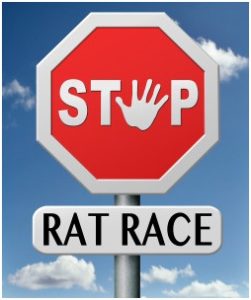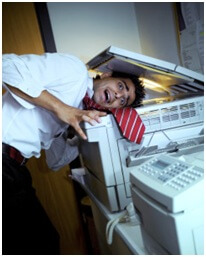Many years ago I suffered from all the classic symptoms of workplace stress. I lost countless hours of sleep (I looked for them everywhere, but to no avail), and had nightmares about work too numerous to count. I began folding confidential memos before faxing them and cc’ing the Pope on my e-mail messages. After a day’s work it would take me two drinks before my hair would unwind. And I actually began to view Hell as a viable career alternative. A job that I felt passionate about now felt empty and meaningless. Yes, I had been utterly and completely Dilbertized.
The turning point for me was when I lost my sense of humor. I knew then and there that I had two choices: I could swallow my integrity, shut down my heart and carry along on cruise control (what management gurus refer to as the “quit-and-stay” syndrome) or I could quit-and-actually-go (what management consultants refer to as the “adios amigos” syndrome). I made the decision and grabbing my sombrero, jumped on my donkey and road off into the sunset in search of sanity. There is nothing remotely unusual about my story (okay, except for maybe the donkey and sombrero part). Workplace stress is taking a toll on workers like never before. In fact, there’s even a new term akin to road rage – yes, welcome to the age of office rage. Each year in the United States there are more than 18,000 workplace assaults and 20 work-related murders. (I know, Americans are crankier than Canadians, but still, it’s a rather frightening statistic.) A mountain of other surveys and statistics support the notion that many workplaces aren’t the healthiest place to be spending 2/3 of our waking hours:
- 58% of folks say their number one source of stress is their jobs
- 46% of people describe their jobs as “highly stressful”
- Work-related stress is estimated to cost the Canadian economy 12 billion dollars a year
- A study of 1,300 British managers showed that 43% of them suffer from “Information Fatigue Syndrome” which made them anxious and stressed
- 46% of people quit their jobs because they feel unappreciated
- 46% of respondents too a recent Fast Company magazine survey said their lives are unbalanced
- A recent medical study suggests that workplace mental stress is a more dangerous health risk than a lack of exercise

The Japanese even have a term, karoshi, which loosely translates to “death by overwork”. During the stress decade of the 1980’s, more than 10,000 Japanese executives a year were thought to be dying due to karoshi. (Here’s a helpful management tip: when your employees are dying they are no longer contributing to your bottom line. If this sounds obvious enough then why aren’t people getting it?) So you get the picture – we’re all a little stressed. And now that you’ve read this, you’re probably even more stressed. Short of riding off on your donkey (often the best choice, by the way), what options do angst-ridden workers have to combat stress? How can we bypass the rat race and re-enter the human race? (Remember the immortal words of Lily Tomlin, “Even if you win the rat race, you’re still a rat”). We’ve all heard the solutions – find a better balance, set realistic goals, manage our time better, set clearer priorities, get-enough-sleep-eat-well-and-exercise, meditate, go bowling, and quit watching Jerry Springer are just a few of the choices facing us on our stress management menu. One of the most powerful stress-busting options, however, is also one of the most under-appreciated, underutilized and undervalued resources we have at our disposal – our sense of humor. Having a healthy sense of humor isn’t about being funny or telling jokes; it’s about having a healthy perspective on our problems. It’s being able to recognize the absurdities in our lives and use that skill to creatively problem solve and manage stress. Like our other senses, a sense of humor is a way of processing and taking in information around us. It’s about tapping into our most human of all traits and learning to take ourselves lightly in order to take our work seriously. Successful organizations are discovering what a powerful a tool our humor resource can be. When applied properly (always read the directions on the label) humor is a proven catalyst for creativity, a team builder, a morale booster and a motivator. Workplace humor opens the door for open and honest communications, establishes trust between managers and employees, reduces employee turnover and absenteeism rates, enhances customer service and can improve the retention of information in training sessions by up to 800%. Studies also indicate that the level of fun and humor in the workplace has a direct bearing on the overall productivity of an organization (in other words, if you’re serious about your business, you can’t be serious). And if all that weren’t enough – our sense of humor, according to some psychologists, is the complete opposite of stress. Humor is a powerhouse of a stress-buster for a few reasons. Mentally, it acts like mind floss – cleaning out the anxieties and debris that accumulates in our brains during times of stress. Humor also changes our perspective – removing the tunnel vision that forms when a stressful situation arises, to give us a broader and more realistic view on our problems. Like a splash of cold water, a healthy dose of humor reminds us of three things: 1) we’re not perfect, 2) we’re human (see #1) and 3) if a meteor the size of Saskatchewan was due to hit earth some time after 3:00, we wouldn’t be wasting our time
“catastrophizing” about this problem. Our sense of humor also helps us cope physically with the side effects of stress.
Every time we have a good laugh here’s what happens: six times the normal level of oxygen enters our lungs and brain, we reduce our blood pressure, massage our internal organs, reduce tension in our face, shoulder and stomach muscles, reduce the amount of stress-inducing chemicals and increases the level of salivary immunoglobulin A, an antibody that defends against viral infections. The effects of a good laugh can last for up to 24 hours. One doctor found that a good 20 second laugh is the equivalent workout of 3 minutes on rowing machine. Another study found that humor works faster on the body than either Valium or Vodka. In other words, our sense of humor is a sugar-free, tax-free, cholesterol-free, nicotine-free, fat-free, non-addictive, environmentally friendly stress-reducing option that doesn’t require any special equipment, membership fees, a $200.00 pair of Nikes or a drive to the gym to use. We carry it with us 24 hours a day, 7 days a week, 365 days a year ‘til death do us part. It’s just a matter of reaching inside us and pulling the little sucker out when we most need it. So if you’re feeling overwhelmed, over stressed and unbalanced in the workplace, remember that it’s easier to find your sense of humor if you don’t misplace it to begin with. How you add humor to your work life isn’t as important as simply remembering to do it. It all starts by giving yourself permission to have fun. And if you’re finding it tough to give yourself the okay (because, sigh, you suffer from “terminal professionalism”) keep in mind the following paraphrase of an Oscar Wilde quote: “Work is far too important to be taken seriously.”
Michael Kerr is an international business speaker, workshop facilitator and author of “Inspiring Workplaces” and “The Humor Advantage.” You can reach Michael at 1-866-609-2640, or drop by electronically at mike@mikekerr.com . For more humor at work resources surf by www.MikeKerr.com.






